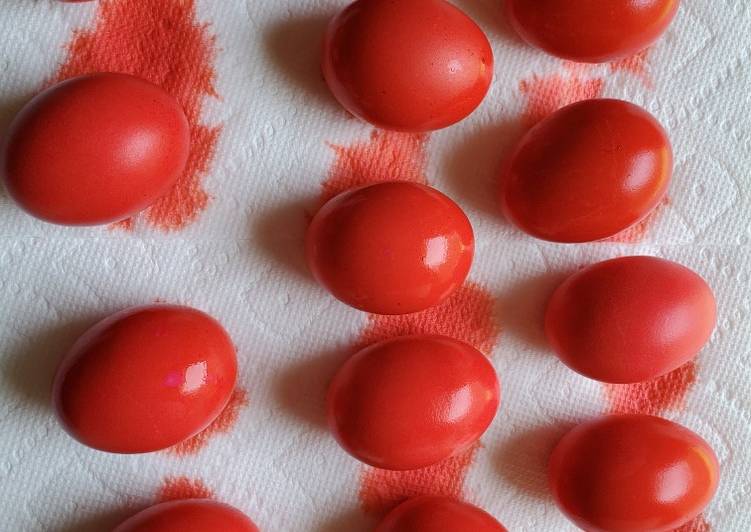Happy Greek Orthodox Easter (Kalo Pascha). During Easter in Greece, travelers are likely to hear a few different greetings and phrases like "Happy Easter," in Greek it is "Kalo Pascha," which is written καλό Πάσχα. On Easter Sunday, many Grecians will also greet others with " Christos anesti " (Christ is risen), and other Grecians will then respond " Alithos anesti" (truly, He. In this spirit, we'd like to wish everyone a very happy Greek and Eastern Orthodox Easter - or, Kalo Pascha!
 See great recipes for Happy Greek Orthodox Easter (Kalo Pascha) too!
In the towns the streets are decorated with Easter egg decorations and banners strung across the roads proclaiming Kalo Pascha- Christos Anesti (Happy Easter - Christ is risen).
No Comments For Greeks and The Othodox Church, Easter- or Pascha as its known is the biggest religious holiday of the year.
You can cook Happy Greek Orthodox Easter (Kalo Pascha) using 8 ingredients and 9 steps. Here is how you achieve it.
See great recipes for Happy Greek Orthodox Easter (Kalo Pascha) too!
In the towns the streets are decorated with Easter egg decorations and banners strung across the roads proclaiming Kalo Pascha- Christos Anesti (Happy Easter - Christ is risen).
No Comments For Greeks and The Othodox Church, Easter- or Pascha as its known is the biggest religious holiday of the year.
You can cook Happy Greek Orthodox Easter (Kalo Pascha) using 8 ingredients and 9 steps. Here is how you achieve it.
Ingredients of Happy Greek Orthodox Easter (Kalo Pascha)
- It's of Farm fresh dark brown eggs, washed.
- Prepare of Two-1 ounce bottles red food dye (I use McCormick).
- Prepare 2 teaspoons of red wine vinegar.
- Prepare of Water (enough to cover eggs).
- It's of Large stainless steel skillet with lid.
- It's spoon of Large stainless steel slotted.
- You need glass of Drinking.
- You need of Tupperware (big enough to hold eggs).
Greeks use a variety of wishes and replies to wishes before and after the Resurrection of Jesus Christ.. but the proper term is Orthodox Pascha. Our fellow Orthodox Christians, in self ruled Orthodox Churches in Russia, Syria, Albania, Romania, Georgia, Ukraine, Ethiopia. Happy Greek Orthodox Easter (Kalo Pascha) XRISTOS ANESTI !! Red eggs represents the blood of Christ sacrificed for our sins ☦ nberardi.
Happy Greek Orthodox Easter (Kalo Pascha) instructions
- Take skillet and add enough water to a rolling boil on the stove.
- After it comes to a boil add each egg with a slotted spoon gently so as not to break Make sure all the eggs are covered.
- Bring water back to a boil and for a couple of minutes (just wait for bubbles).
- Then cut the heat off and place the lid on the skillet for 15 minutes.
- Drain the HOT water and place tap water over the eggs to cool then set aside.
- Take drinking glass and mix 2 tsp of vinegar and one ounce bottle of red dye with some water and mix thoroughly.
- Place eggs in the Tupperware using slotted spoon and leave the water in the skillet.
- Add the glass mixture to the water in the skillet and add the other bottle of red dye....mix thoroughly and pour over eggs in Tupperware. Snap the lid securely and place in fridge overnight.
- In the morning take each egg out separately using slotted spoon and drain on paper towels!! I guarantee you will have blood red eggs for Pascha!! ❤❤.
Pascha is a transliteration of the Greek word, which is itself a transliteration of the Aramaic pascha, from the Hebrew pesach meaning Passover. A minority of English-speaking Orthodox prefer the English word "Pasch." Pascha normally falls either one or five weeks later than the feast as observed by. Happy Easter - Kalo Paskha Easter (Old English: Ēostre; Greek:. The term "Pascha", from the same root, is also used in English to refer to Easter. Easter customs vary across the Christian world, but decorating Easter eggs is a common motif..